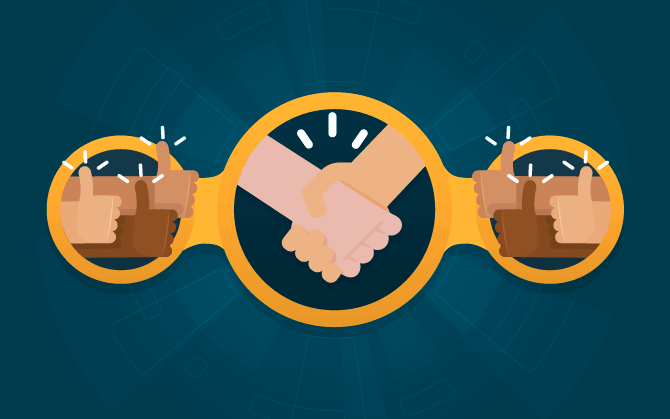
How to develop your interpersonal relationship in 10 steps
Find out how you can develop this skill and improve professionally!

What will we see in this post
Do you know what interpersonal relationships are? You have probably heard about it if you have ever worked in any type of organization.
Interpersonal relationships are the relationships between people in different contexts.
And one of the main contexts in which this issue comes up is within corporate environments, especially because relationships in these environments are complex. This is because relationships between employees, and between them and their leaders, directly influence the work.
In other words, everyone should pay attention to their professional relationships, aiming at the quality of the work as well as their career development.
Therefore, when we talk about interpersonal relationships, we’re talking about knowing how to relate; in other words, the ability to get along.
It has nothing to do with personality and personal traits. Actually, it’s a skill that can be worked on and improved by all.
Below, you will learn a bit more about interpersonal relationships at work and the steps to improve your own. Shall we get started?
Interpersonal relationships at work
Whether within the corporate environment (teamwork), or even in relationships with customers, to get along with them without any problems, you need to know how to deal with other people.
At work, interpersonal relationships are like a game, in which if you aren’t careful with the rules, or make a wrong move, your development may be in jeopardy.
And the company also loses, because relationship problems influence in the organizational environment and hinder the progress of businesses.
Thus, every professional must keep in mind the importance of taking care of their professional relationships regarding their career and their own experience within the company.
When people have good workplace relationships, they feel happier and more motivated.
But we know that it isn’t always possible to maintain positive relationships, especially because the corporate environment is very competitive. Besides, each person has different experiences and particularities.
So, as we mentioned earlier, knowing how to maintain good relationships isn’t 100% natural, it’s like a game in which those who want to keep playing and are willing to make it work, need to make an effort towards it.
Fortunately, this effort is worthwhile and has positive results, check it out!
The importance of good interpersonal relationships for your professional life:
- You get along better with your coworkers
- You feel more motivated
- You’ll have someone you can count on when you need help
- Your performance improves
- You have better chances of growth in your career
- You’ll probably be admired more in professional terms.
On the other hand, companies also benefit greatly when there are good interpersonal relationships between employees, leaders, customers and suppliers.
Therefore, they feel that it’s important to encourage and promote integrations in order to generate positive results for the business.
Some of the advantages of good interpersonal relationships for companies are:
- Improvement to the organizational environment
- Higher employee productivity
- Lower employee turnover
- Increased customer satisfaction
- Higher profitability.
10 steps to develop your interpersonal relationships
Well, by now you can understood what interpersonal relationships are and their importance in the workplace.
Now, we’re going to show you the steps so you can develop this skill.
You might only need a few of these tips. So, identify them and put those you need to work on into practice, so you can achieve good relationship skills.
1- Create a culture of feedback
The culture of constant feedback is a great way to develop the work and encourage communication among the team.
By providing and asking for feedback, you demonstrate an interest in a relationship with your coworkers. Providing feedback shows them that you want to help, and asking for it, shows that their opinion is important to you.
This is a win-win situation, isn’t it?
2- Learn how to deal with differences
A lot of countries have an ethnically diverse population and also people with different personalities; everything changes from person to person. And this is great, because diversity makes the workplace a better, more innovative and creative place.
Nevertheless, we might not be used to coexisting with people who are very different from us, but we can work on it.
In order to get along better with your coworkers, you need to be willing to open up your mind and learn how to coexist with diversity.
This will help you have good interpersonal relationships and make your daily life better.
In addition, you’ll also realize that you can learn a lot from the experiences of people who are different from you, which is great for the development of your cognitive intelligence.
3- Be resilient
Resilience, in the professional sense, means knowing how to adapt to daily changes and adversities. In other words, in order to have better relationships at work, it is also necessary to be flexible when something goes wrong.
For example, a typical situation is when you throw yourself into a project that needs to be approved by a team, and after it’s approved, an adverse situation occurs and they ask you to do it over again.
You feel like shouting at everyone, but this is where resilience comes in. With a little patience mixed with the wisdom of trying to understand what happened, and talking to the team in order to find a group solution.
It’s not easy, but with a lot of practice and willpower, it will come naturally.
Oh, don’t confuse resilience with the acceptance of anything thrown at you, including injustices; this is another issue. Therefore, the wisdom of trying to understand why the adversity occurred is a key point of resilience.
4- Ask for help and be helpful
It might sound silly, but asking for help strengthens workplace relationships.
If you’re aware that someone is an expert in something that you have questions about, or something you’d like to learn, just ahead and talk to that person.
This attitude brings people closer, because at work, we don’t have much contact with our coworkers’ personal lives, which makes it harder to start a conversation. Therefore, asking for help might be a great way of getting close with someone.
Being helpful works more or less in the same way. It’s a way of showing that you are there for others and that you care about teamwork, in addition to also being a great way of getting closer to people.
5- Invest in non-aggressive communication
We usually don’t realize this, but how we communicate with others might sound aggressive.
This oversight is terrible and destroys workplace relationships, which should be good.
Therefore, being aware of how you communicate is extremely important for good interpersonal relationships.
To find out if you communicate aggressively, start paying attention to how you talk to other people.
If you notice problems, such as lack of clarity, impositions, orders and judgments, try to apply the tips below so you can practice non-aggressive communication:
- Make observations instead of judgments
- Express your feelings
- Express motives and needs
- Ask instead of ordering.
By doing so, your communication will be more effective, generous and empathetic. As a result, you’ll have better relationships with your coworkers.
6- Welcome interaction
Even if you’re an introvert, don’t allow this trait to get in the way of your interpersonal relationships.
It might be hard, but it’s quite easy. Try not to isolate yourself and welcome interaction, i.e., talk to those who talk to you.
Start with something simple like a general good morning or goodbye. Over time, create the habit of making daily and constant interactions to strengthen your relationships.
7- Avoid conflict
Okay, problems, disagreements and stalemates will always happen. But be careful so that such situations don’t get in the way of good relationships.
Take a deep breath and think before saying something when you’re mad. Always keep an eye on your main objective: having a pleasant environment in which to coexist at work.
8- Don’t bring your personal problems to the workplace
This is classic! We all go through struggles, don’t we?
Ideally, you shouldn’t allow problems unrelated to work affect your professional relationships.
Therefore, don’t bring your personal problems to the workplace so you don’t take them out on others who have nothing to do with them.
If you need to, take the day off or let your coworkers know that you’re having a bad day.
9- Learn how to forgive
Even if a conflict already exists, there is a way out.
Forgiveness is the path to re-establish relationships and demonstrate that you fight for a good coexistence in the workplace.
So, know when to forgive and to ask for forgiveness in the name of good interpersonal relationships.
10- Know yourself
Finally, but not less important, we have self-knowledge. A very important step in knowing how to create good relationships.
Here, we talked about interpersonal relationships, but as important is intrapersonal relationship, which means knowing oneself.
Your relationship with others is part of what you are; therefore, it’s only fair that you develop your self-knowledge in order to improve your external relationships.
While we’re on the subject, one way of achieving self-knowledge is through self-assessment. So check out the 7 tips for a self-assessment and propel your professional development!




